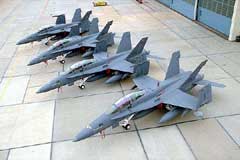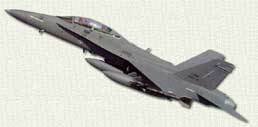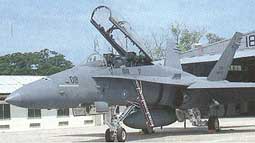 |
|||||
Main>Articles>Military Stuff>F/A-18D Hornet
F/A-18D Hornet
 The
Malaysian air force ordered 8 of the the two seater F/A-18D Hornet in
1996 to complement its MiG-29N fleet. Also to be included in the order
were AIM-9M missles, Aim-7F missles and nearly 100 rounds of AGM-84 Harpoon
anti-ship missles as well as laser-guided bombs.
The
Malaysian air force ordered 8 of the the two seater F/A-18D Hornet in
1996 to complement its MiG-29N fleet. Also to be included in the order
were AIM-9M missles, Aim-7F missles and nearly 100 rounds of AGM-84 Harpoon
anti-ship missles as well as laser-guided bombs.
Technically, the F/A-18D Hornets of
the RMAF are more advanced the earlier F/A-18Ds because of their added
night-attack capability which comes forth from the improved APG-73 multi-mode
radar. The night-attack capability is further bolstered by the usage of
the NiteHawk pod, which can provide ground target identification, tracking
and laser illumination in pitch-dark conditions. In operational terms,
the RMAF Hornets will be used to conduct raids under the cover of darkness
to avoid detection by enemy forces.
Another prominent role of the Hornets is anti-shipping.
From their base in Butterworth, the Hornets are poised to strike at enemy
vessels operating in the narrow Straits of Malacca. The primary weapon
for this role will be the AGM-84D Harpoon.
While in service with the US Navy, the Hornet has earned itself a reputation
for being an exceptional multi-role fighter. During the Gulf War, Hornets
often performed intercept and strike missions at the same time, destroying
enemy fighters on their way to their ground targets. This has earned the
Hornet the nickname 'One Plane Air Force'. Because of its affordability,
light weight and heavy weapons load, the Hornet has become the plane of
choice for the US Navy and US Marine Corps where it is being scheduled
to replace the ageing F-14 Tomcat interceptors which are more expensive
to operate. Its high speed and above average agility makes the Hornet
extremely survivable on ground attack missions. Meanwhile, its advanced
radar gives it an added edge in air combat, escpecially in BVR situations.
 Along with the
induction of the F/A-18Ds, the RMAF also acquired a precision-strike capability.
The GBU-24 Paveway II laser-guided bombs greatly increase the air force's
capability in conducting surgical strikes deep into enemy territory under
all types of weather, while drasctically reducing the risk of collateral
damage. Apart from the LGBs, the Hornets also carry AGM-65 Mavericks,
which can be guided using laser or IIR. Other weapons carried by Malaysian
Hornets include Mk. 8x series iron bombs, unguided rockets and a built-in
cannon.
Along with the
induction of the F/A-18Ds, the RMAF also acquired a precision-strike capability.
The GBU-24 Paveway II laser-guided bombs greatly increase the air force's
capability in conducting surgical strikes deep into enemy territory under
all types of weather, while drasctically reducing the risk of collateral
damage. Apart from the LGBs, the Hornets also carry AGM-65 Mavericks,
which can be guided using laser or IIR. Other weapons carried by Malaysian
Hornets include Mk. 8x series iron bombs, unguided rockets and a built-in
cannon.
With its inherent in-flight refuelling capability,
the Hornet is capable of conducting operations over extended distances,
thus greatly increasing their deterrent value and effectiveness. However,
the days of the Hornets in RMAF service could be numbered, since they
will most probably be traded-in when Malaysia purchases the new-generation
F/A-18F Super Hornet from the United States.
Designation : F/A-18D Hornet
Producer : Boeing & McDonell Douglas
Role : Multirole Fighter
Crew : 2
Engines : 2 General Dynamics F404 turbofans
Top Speed : Mach 1.8
Max Altitude : 50,000 ft
Combat Radius : 550 nm
Radar : Hughes AN/APG-73 Airborne Radar
Weapons : M61A1 20mm Vulcan cannon, 17000 lbs of munitions on 9 external
hardpoints to include AIM-9M short range IR missles, AIM-7F Sparrow medium
range semi-active radar guided missles, AIM-120C medium range active radar
guided missles , AGM-84 Harpoon anti-ship missles, AGM-63 Maverick TV
guided air-to-ground missles, MK82/83/84 free-fall bombs, laser-guided
bombs and virtually all standard munitions in the US Navy inventory. Also
carries external fuel tanks.
Back